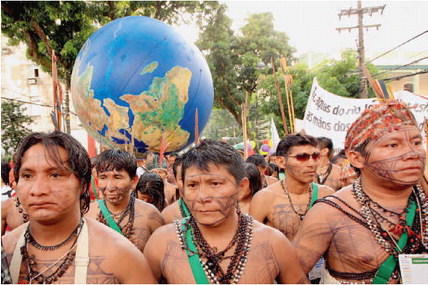Denis
Viénot,
President
of Chrétiens en Forum
Some lessons from the World Social Forum
Water
is not a commodity like others. It is not even a commodity.
It is the very life and essence of all humanity.
The
World Social Forum, which has just taken place in Belém
(Brazil), has truly lived up to its name more than ever: Forum!
Because, with over 2,000 symposia, workshops and seminars, this
gigantic brilliant fair continues to be a rare occasion for a
cultural melting pot and exchanges stimulating reflection and
dynamism among the 130,000 participants coming from every corner
of the world’s civil society. All this against the
background of the Brazilian soul which, through its music and
dance, becomes universal.
Not only Forum, but also
Social! The theme of this get-together was primarily to make it
known that the poorest people are the first victims of the
dysfunctional activities of the richest people on our planet: the
financial crisis, climatic imbalance… The obvious risk of
this type of meeting is that it stays at the level of the agora;
and yet, despite the effervescence of the material organisation,
the Forum demonstrated that the voices of the poor must be heard
if the world wants to remain humane. There were four examples
that illustrated this social dynamic.
There was the
workshop where a Brazilian peasant involved in the infernal
process of poultry production, under the ever-increasing pressure
of a food distribution company, met up with a colleague from
Cameroun, a victim of imports coming from Europe. The Brazilian
is crippled by debt and exports his production. In Europe, only
the best parts are kept and the frozen carcasses are then sent to
Africa. They prove to be the ruin of local producers and are also
harmful for health due to frequent breakdowns in the cold chain,
through electricity breakdowns and the ambient temperatures.
The work on the financial crisis, supported mainly by the CCFD
(Catholic Committee against Hunger and for Development), Secours
Catholique and Attac, highlighted the emergence of several strong
tendencies. Faced with a systemic crisis, affecting “food,
finance, the economy, the climate, energy, migration … and
civilisation”, it
is not enough to socialise the losses to ensure the survival of a
system that privatises everything, even nature itself… We
must ensure that social needs are satisfied and the rights of
nature are respected, that there is harmony between “Mother
Earth”, society and culture, as has been stated in the
declaration of the indigenous peoples. In order to achieve this,
the role of the nation states and the United Nations has to be
reassessed: a real regulation of the financial sector has to be
put in place, social and environmental criteria have to be
introduced into the mechanisms of financing and credit, tax havens
have to be dismantled and the fight against corruption, for
example, by establishing greater transparency in national and
international contracts regarding their royalties and profits;
and there has to be improved surveillance of elections and their
financing, as has been carried out for years by the Church in the
Philippines.
In the final declaration, “The
Assembly on Water” considered that our economic system has
“declared
war on nature,
water, air, the earth, the forests, and on all our common natural
assets.” The
Assembly categorically rejects the privatisation of water in all
its forms, while guaranteeing solidarity between the generations.
Water is not a commodity like others. It is not even a commodity.
It is the very life and essence of all humanity. Yet there are
“water pirates” who purchase water, for example, in
Argentina, only to sell it for ten times the price in the Middle
East. When we learn from a recent report issued by the United
Nations Environment Programme that 17% of the Amazonian forest has
been destroyed over five years in order to sell the wood, set up
the cultivation of soya and agri-fuels, and to increase farming,
we are shocked by its disappearance and what will disappear over
the next twenty-five years if this state of affairs continues.
The Bishop and President of Justice and Peace for the north-east
region of Brazil, Dom José Luiz Azcona, was most disturbing
when he described this region as a territory sold by Brasilia to
the major companies. “The Assembly of Urban Social
Movements” has expanded the notion of the right to housing
to the concept of “the right to the town”, which is
being threatened by an increase in forced evictions. This global
right to housing seeks to integrate social and environmental
justice. At the beginning of the event, there were two illegal
sit-ins that took place in the town and suburbs of Belém
organised by the Movement of Homeless Urban Workers, which
illustrated this problematical situation. The goal was akin to
the actions of the Landless Peasants Movement in rural areas who
establish themselves on empty plots of land and stay there in
order to obtain legal recognition, after some years, for the
benefit of entire families of squatters.
In conclusion,
this eighth Social Form has pursued its original intent which is
to permit “every
man and all men” (Paul
VI) to develop, but to develop in real terms, physically –
indeed, a Bolivian friend once told me that in his Aymara
language, the word ‘development’ did not exist, but
the expression “living
well” did
exist!
![]()

The
opening of the World Social Forum in Belém, Brazil, on 27
January 2009. Faced
with a systemic crisis, it is imperative to ensure the harmony
between “Mother Earth”, society and culture, according
to the declaration of the indigenous peoples.
LUCIVALDO
SENA/AE/AFP